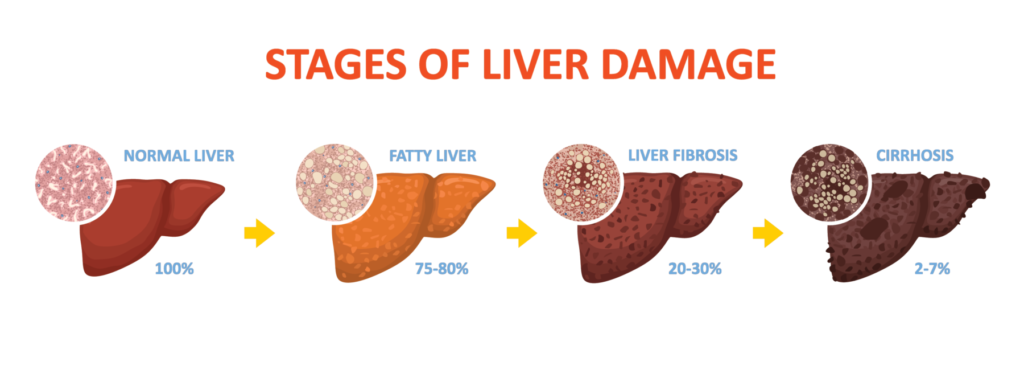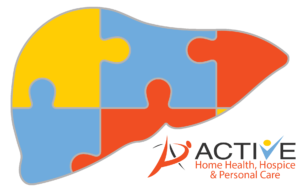
The progression of liver disease is hard to predict, as it has an up and down trajectory of poor health mixed with periods of exacerbations that often require hospitalization. Hospice for liver failure helps you manage the physical symptoms and emotional toll associated with liver disease.
The liver is the second largest organ in the body and is responsible for over 500 different functions within the body. Some of these functions include the synthesis of proteins, enzymes and fat, the regulation of carbohydrates, the formation and secretion of bile and the removal of bacteria, foreign particles, and harmful metabolites like ammonia.
Liver damage occurs in a cycle of inflammation, damage, and regeneration. When this cycle is repeated over and over, eventually the cycle breaks. The liver is not able to regenerate the same way. Instead of allowing the regeneration of proper tissue, healthy tissue is replaced with fibrotic or scar tissue.
Some of the most common causes of liver damage are:
- Alcohol Abuse
- Viral Hepatitis
- Diabetes
- Obesity
- Damaged or blocked bile ducts
- Heart Failure

- Nonspecific symptoms of fatigue, anorexia, and weight loss
- Portal hypertension
- Esophageal varices
- Ascites
- Hepatic encephalopathy
- Jaundice
- Increased risk of bleeding and bruising
The only one way to reverse cirrhosis of the liver is through a liver transplant. The average patient with decompensated cirrhosis survival rate is 2 years without a transplant. Unfortunately, the demand is higher than the supply. About 14% of patients waiting for a liver transplant will pass away before receiving one.
When does a Person with Liver Failure Qualify for Hospice?
Like COPD and heart failure, the progression of liver disease is hard to predict. It has an up and down trajectory of poor health mixed with periods of exacerbations that often require hospitalization. Decreased liver function and increased symptoms qualify a patient for hospice care.
Some of the symptoms that qualify a patient for hospice care include:
- Ascites resistant to standard therapy
- Bacterial peritonitis
- Hepatorenal syndrome
- Hepatic encephalopathy
- Recurrent variceal bleeding despite therapy
Most people with liver failure do not take advantage of hospice services. This can be tied into the uncertainty of the disease and the hope of receiving a transplant. Also, current treatment guidelines do not offer any recommendations for end of life care and planning.
Managing Liver Failure with Active Hospice
The goal of end stage liver disease is the management of symptoms. This doesn’t change when you opt for hospice care. In fact, symptoms often improve when hospice begins. Our care plans offer relief from pain, itching, confusion, and swelling among other symptoms. We monitor you for bleeding risks and help with your nutrition too.
Active Hospice provides more than comfort care at the end of life. End stage liver disease carries with it a certain level of uncertainty about the disease progression that can lead to depression, anxiety, and fear. Our chaplains and medical social workers can help bridge the gap and provide a more complete level of care on a both spiritual and emotional level.
Why Choose Active Hospice?
Waiting for a liver transplant is overwhelming and stressful. There is hope for a brighter tomorrow but uncertainty about living long enough to realize that hope. Active Hospice understands the toll that liver failure has on a person. Our loving care team is here to help you manage the physical symptoms and emotional toll associated with liver disease. If you or a loved one are struggling with liver failure, give us a call. Schedule your free, in-home consultation today and see how Active Hospice can help provide the quality, control, and comfort you want as you prepare for life’s final journey.



